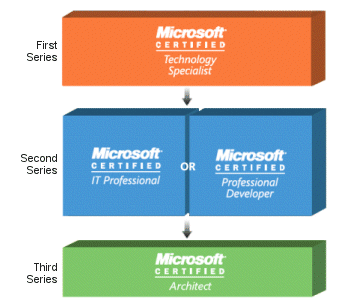The new certification program introduces three series of certifications:
1). Microsoft Certified Technology Specialist (MCTS)
This series certify principal technology and product skills, for instance implementation skills. MCTS is reliably qualified of implementing, building, troubleshooting, and debugging a specific technology. MCTS exams are targeted to specific technology, so that an individual can prove his proficiency in specific area. MCTS is available in different domains of IT; Developer Applications (.Net), Database Administration (Microsoft SQL Server), Server technology (Windows Server, Exchange Server), Windows (Windows Vista, Windows XP), Microsoft Office and Security.
2) Microsoft Certified Information Technology Professional (MCITP) and Microsoft Certified Professional Developer (MCPD)
This series confirms job-role skills outside the main technology, such as, analyzing business problems amongst others. MCITP or MCPD are fully capable of deploying, building, designing and operating technologies for a particular job role.
3) Microsoft Certified Architect (MCA)
This series certify the skills required to affect IT business successfully. MCA requires advanced and certifiable experience in IT (at least 10 years). MCA certification does not depend on traditional exams or curriculum. In fact, candidates have to prove their skills by creating architectures that solve complicated business problems.
Q. Why did Microsoft introduce the new certifications?
Ans. Microsoft is changing the certification program to better meet the needs of our customers. We heard from IT managers that the proliferation of credentials is making it more difficult to understand which credentials best meet the needs of their businesses. Individuals told us that they wanted to be able to distinguish themselves from other IT professionals. In response, we created a framework that keeps the number of credentials to a minimum while still allowing individuals to highlight specialization.







Dot Net Online Training | Online Dot Net Training India
ReplyDeleteOnline Dot Net Training | C# Online Training